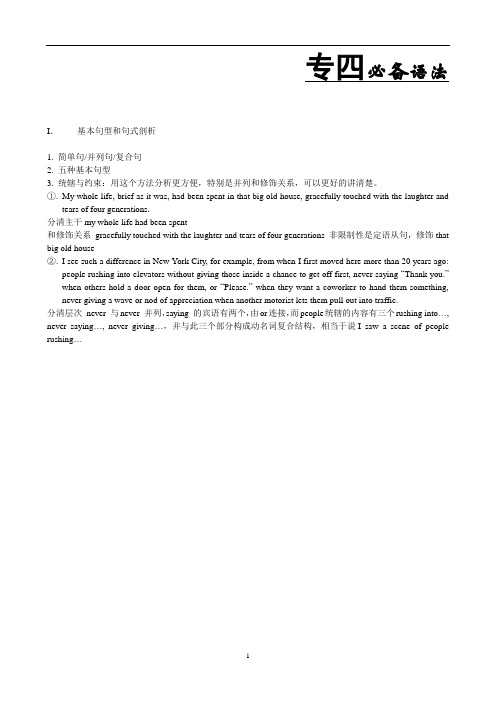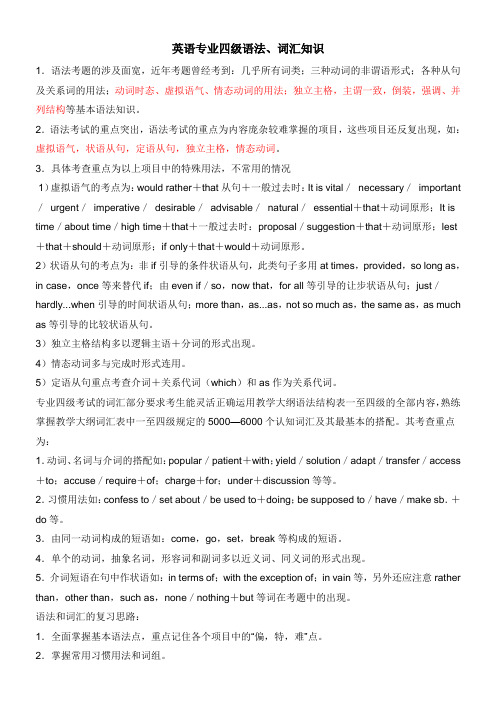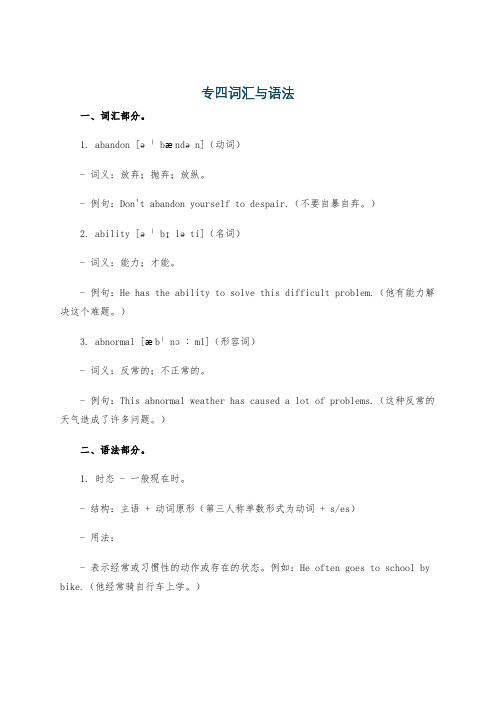专四必备语法
英语专四语法复习内容

英语专四语法复习内容想要通过英语专四考试,就必须掌握英语专四的语法。
那么英语专四的语法有哪些呢?下面由店铺为大家整理的英语专四语法内容,希望大家喜欢!英语专四语法内容一 There be 结构1. There be结构There were very few people left when we got there.There have been many such incidents.Nearby there had been a fight in full progress.也可以是情态动词 +beThere can be very little doubt about his guilt.There may always be instances about which we are uncertain. There ought to / should be some instructions on the lid.还可以是There +情态动词+ be 的完成时There may have been an accident.If the criminal had come this way, there would be / would have been footprints. There should / ought to have been someone on duty all the time.2. There + 半动词+ be,这里很少用完成体形式.There is certain to be trouble at the factory.There is sure / likely to be some rain tonight. There seems / appears to be no doubt about it.3. There be结构也可有被动式,这类there be结构有些可以与there be结构的一般形式相互转换。
【实用文档】专四语法总结.doc

专四必备语法I.基本句型和句式剖析1. 简单句/并列句/复合句2. 五种基本句型3. 统辖与约束:用这个方法分析更方便,特别是并列和修饰关系,可以更好的讲清楚。
①.My whole life, brief as it was, had been spent in that big old house, gracefully touched with the laughter andtears of four generations.分清主干my whole life had been spent和修饰关系gracefully touched with the laughter and tears of four generations 非限制性是定语从句,修饰that big old house②.I see such a difference in New York City, for example, from when I first moved here more than 20 years ago:people rushing into elevators without giving those inside a chance to get off first, never saying “Thank you.”when others hold a door open for them, or “Please.” when they want a coworker to hand them something, never giving a wave or nod of appreciation when another motorist lets them pull out into traffic.分清层次never 与never 并列,saying 的宾语有两个,由or连接,而people统辖的内容有三个rushing into…, never saying…, never giving…,并与此三个部分构成动名词复合结构,相当于说I saw a scene of people rushing…③.It adds priceless panache (n.) to your understanding of the way people behave.注意add sth. to 分割的状况II. 词法部分1.名词与代词1)不可数名词的量化表示修饰可数名词复数: many, a good/great many,a good/great/large number of修饰不可数名词: much, a great deal of, a large amount of两者都可修饰: a lot of, lots of, plenty of, a great/large quantity of, quantities of, a large sum of2)在汉语中可数,但在英语中为不可数名词的某些词advice, baggage (luggage), damage, equipment, furniture, homework, information, news ...3) 与所指代的名词在性、数、格上是否一致如:Each cigarette a person smokes does some harm, and eventually he may get a serious disease from its effect.It was during the 1920’s that the friendship between the two American writers Hemingway and Fitzgerald reached its highest point.4) that, one的指代作用that指代不可数名词和单数可数名词(如是复数,用those),后面通常跟有修饰语,如出现在比较结构中的that of。
英语专四语法、词汇知识大全

英语专业四级语法、词汇知识1.语法考题的涉及面宽,近年考题曾经考到:几乎所有词类;三种动词的非谓语形式;各种从句及关系词的用法;动词时态、虚拟语气、情态动词的用法;独立主格,主谓一致,倒装,强调、并列结构等基本语法知识。
2.语法考试的重点突出,语法考试的重点为内容庞杂较难掌握的项目,这些项目还反复出现,如:虚拟语气,状语从句,定语从句,独立主格,情态动词。
3.具体考查重点为以上项目中的特殊用法,不常用的情况1)虚拟语气的考点为:would rather+that从句+一般过去时:It is vital/necessary/important /urgent/imperative/desirable/advisable/natural/essential+that+动词原形;It is time/about time/high time+that+一般过去时:proposal/suggestion+that+动词原形;lest +that+should+动词原形;if only+that+would+动词原形。
2)状语从句的考点为:非if引导的条件状语从句,此类句子多用at times,provided,so long as,in case,once等来替代if;由even if/so,now that,for all等引导的让步状语从句;just/hardly...when引导的时间状语从句;more than,as...as,not so much as,the same as,as much as等引导的比较状语从句。
3)独立主格结构多以逻辑主语+分词的形式出现。
4)情态动词多与完成时形式连用。
5)定语从句重点考查介词+关系代词(which)和as作为关系代词。
专业四级考试的词汇部分要求考生能灵活正确运用教学大纲语法结构表一至四级的全部内容,熟练掌握教学大纲词汇表中一至四级规定的5000—6000个认知词汇及其最基本的搭配。
专四语法——精选推荐

一、附加疑问句 (2)二、比较句式 (2)三、倒装 (4)四、虚拟语句 (5)五、非谓语动词 (8)六、从属分句 (10)(一)状语从句 (10)(二)关系从句(定语从句) (13)(三)名词性从句 (14)一、附加疑问句附加疑问句由两部分组成,前面是一个陈述句,后面是一个简短问句,下面分析几种特殊的附加疑问句形式:1. 如果陈述部分是祈使句,附加疑问句部分一般使用will you, w on’t you例如:Pass me some salt, won’t you?递给我一些盐,好吗?2. 如果陈述部分的主语是this, that, these, those时,附加疑问句部分的主语为it或they例如:This is exciting, isn’t it?这很令人兴奋,不是吗?3. 如果陈述部分是一个复合句,则分两种情况:1) 一般情况下,附加疑问句部分的主语应与陈述部分的主语保持一致,例如:Mary said her son would come, didn’t she? 玛丽说她的儿子要来,不是吗?2) 但如果陈述部分的主语是第一人称,且谓语动词是suppose, think, believe等,附加疑问句的主语则应该与从句的主语保持一致,例如:I think he will come, won’t he?我认为他会来,不是吗?4. 如果陈述部分是there be存在句,附加疑问句部分的主语也应该用there例如:There are some books, aren’t there?有一些书,不是吗?5. 如果陈述部分中带有否定词或半否定词,如never,hardly,scarcely,seldom,no,none,no one,rarely,nowhere,nothing,nobody,few,little等,附加疑问句的谓语要用肯定形式例如:There are rarely extremes of cold or heat in Britain, are there?英国很少出现严寒或酷暑天气,是吗?二、比较句式1. 形容词、副词比较级和最高级的用法1) 比较级修饰语(a) 比较级之前的副词修饰语常用many, much, far, a little, a bit, slightly, a great deal, a lot, somewhat, rather, etc.。
2023年专四语法总结

专四必备语法一、时态、语态时态、语态需要掌握旳要点:1.体现未来时旳形式:(1)在时间、条件、让步从句中,一般目前时替代未来时,但要注意区别从句旳类型,如:I’ll tell him when you will ring again. 我告诉他你什么时候再来。
(宾语从句)比较:I’ll tell him when you ring again.你再打时我告诉他。
(状语从句)(2)在make sure, make certain, see (to it) 后旳that从句中,谓语动词用一般目前时替代未来时,如:See to it that you include in the paper whatever questions they didn’t know the answer to last time.(include 不能用will include或其他形式) 2.完毕时是时态测试旳重点,注意与完毕时连用旳句型和时间状语:(1)by/between/up to/till +过去时间、since、by the time/when +表达过去发生状况旳从句,主句用过去完毕时。
如:We had just had our breakfast when an old man came to the door.Between 1897 and 1919 at least 29 motion pictures in which artificial beings were portrayed had been produced.(表达1923年时已发生旳状况) (2)by +未来时间、by the time/ when +谓语动词是一般目前时旳从句,主句用未来完毕时。
如:By the time you arrive in London, we will have stayed in Europe for two weeks.I hope her health will have improved greatly by the time we come back next year.(3)by now、since +过去时间、in/during/for/over/the past/last few(或详细数字)years/days/months,主句用目前完毕时,如:The changes that had taken place in air travel during the last sixty years would have seemed completely impossible to even the most brilliant scientists at the turn of the 19th century.但在it is +详细时间since/before这一句型中,主句更多旳时候不用完毕时。
专四词汇与语法

专四词汇与语法一、词汇部分。
1. abandon [əˈbændən](动词)- 词义:放弃;抛弃;放纵。
- 例句:Don't abandon yourself to despair.(不要自暴自弃。
)2. ability [əˈbɪləti](名词)- 词义:能力;才能。
- 例句:He has the ability to solve this difficult problem.(他有能力解决这个难题。
)3. abnormal [æbˈnɔːml](形容词)- 词义:反常的;不正常的。
- 例句:This abnormal weather has caused a lot of problems.(这种反常的天气造成了许多问题。
)二、语法部分。
1. 时态 - 一般现在时。
- 结构:主语 + 动词原形(第三人称单数形式为动词 + s/es)- 用法:- 表示经常或习惯性的动作或存在的状态。
例如:He often goes to school by bike.(他经常骑自行车上学。
)- 表示客观事实或普遍真理。
例如:The earth moves around the sun.(地球绕着太阳转。
)2. 名词的数 - 可数名词复数形式。
- 规则变化:- 一般情况加 -s,如book - books。
- 以s, x, ch, sh结尾的加 -es,如box - boxes。
- 以辅音字母 + y结尾的,变y为i加 -es,如city - cities。
- 不规则变化:- 如man - men,woman - women,child - children等。
3. 形容词和副词的比较级和最高级。
- 规则变化:- 单音节词和部分双音节词:- 一般情况加 -er(比较级)和 -est(最高级),如tall - taller - tallest。
- 以e结尾的加 -r和 -st,如nice - nicer - nicest。
专四语法详细归纳
2. 以-s结尾的名词做主语的主谓一致 • 疾病名词: 单数:arthritis关节炎,bronchitis支气管炎,rickets软骨病,mumps 腮腺炎,diabetes糖尿病 可作单数也可作复数: rickets软骨病,measles麻疹 • 游戏名称一般做单数,表示游戏所用镖等意义时用复数 Darts投镖,marbles打弹子游戏 Cards用复数:Cards are not allowed here. • 地理名称 国名用单数 群山、海峡、瀑布用复数 The Himalayas have a magnificent variety of plant and animal life. • Scissors, glasses, shorts, trousers一类词单独使用用复数,加上单 位词,如a pair of 由单位词单、复数决定 • -ings结尾的名词一般用复数 The clippings of the hedges are usually hurt. • 特例(见语法P33) The only means to achieve success is to appeal to arms. All means have been tried out to increase agricultural production.
4.并列结构作主语时的主谓一致 Egg and milk is a good breakfast. (这里的鸡蛋和牛奶都指 一顿早饭,不可分割)
Fish and chips(炸鱼土豆片 ) is a popular supper here. • 当and连接的并列名词词组带有each, every或者many a 等限定词时,随后动词常用单数 Many a man and woman in this community finds himself or herself in need. Every boy and girl in the class is given a copy of the photo. • 主语后跟有由as much as, rather than, more than, no less than, as well as, in addition to, with, along with, together with, except等引导的结构或词组,取决于主 语本身形式。
专四语法汇总
专四常考语法点汇总:一.虚拟语气1.虚拟条件句1) 倒装结构:条件句有were, had, should时,可使用倒装结构。
e.g. Were it necessary, I would resign.Had you informed me earlier, I would have come over.Should you meet her, you should not be able to recognize her.2) 错综时间条件句e.g. If I my umbrella with me this morning, I wet now. DA. had taken … would not have beenB. took… should not beC. were to take … would not beD. had taken … should not be3) 无条件的虚拟句:but for, with, without, or, but, otherwise, in case of, what if, etc.2.I wish…/If only句式:与现在事实相反,用were或动词的一般过去式;与过去事实相反,用had+过去分词;表示将来没有把握或不太可能实现的愿望,用would/could/should/might+动词原形。
3.as if引导的从句(注意区别事实与假设)Some black clouds are floating in the sky. It looks as if . BA.it might rain B it is going to rain C it would be rainy D it was to rain4.在suggest, order, demand, propose, desire等表示建议、命令、态度等词(包括动词和名词)引导的名词从句中用should+动词原形,should可省。
专四语法重点总结
eg.
He is no richer than I= as poor as
He is not richer than I
4) more and more
eg. He is becoming fatter and fatter.
5). The more… the more…
Eg. He neither likes fiction nor (likes) poetry.
8) more than简直不
eg. My trip to Beijing is more than sightseeing.
六、并列结构
两个或两个以上意义相关、层次相同、句法功能也相同、并由并列连词或其他并列手段连接起来的语法结构序列叫做并列结构。
1.并列结构的各种形式
1)词与词的并列you and me
2) not only…but also连结成分和连接句子;只连对等结构
Eg. Not only I but also he will take part in the meeting.
Not only did he help me, but also he sent me home.
3) either…or连结成分和连接句子;连对等结构或不对等结构
单音节词尾e,加r, st fine finer finest
闭音节单音节词尾只有一个辅音字母,双写big bigger biggest
辅音字母加er,est
少数以y,er,ow, ble结尾
双音节词尾加er,est happy happier happiest(y前为辅音字母去y加clever cleverer cleverest
(完整word版)英语专业四级考试语法汇总(word文档良心出品)
独立主格结构独立主格结构(Independent Genitive)有两部分组成,前一部份是名词或者代词,后一部分是非谓语动词(不定式、动名词和分词)或形容词、副词、或介词短语。
前后两部分具有逻辑主谓关系。
独立主格结构在句中做状语,多用于书面语。
独立主格结构本身不是句子,在句子中作状语,表示时间、原因、条件、伴随、目的等。
非谓语动词作状语,其逻辑主语须与主句主语保持一致。
若不一致,非谓语动词形式须另带主语,从而构成复合结构的形式作状语。
这种结构称为“独立结构”。
其中,非谓语动词主动用现在分词,被动用过去分词。
非谓语动词及其短语前面带有逻辑主语,逻辑主语的代词又是主格,故常称为“独立主格”。
“独立结构”在句中起状语作用,相当于状语从句,表示时间、原因、条件、方式或伴随等情况。
功能独立主格结构主要用于描绘性文字中,其作用相当于一个状语从句,常用来表示时间、原因、条件、行为方式或伴随情况等。
例如:表示时间The meeting being over, all of us went home. 开完会后我们都回家了。
Her work being done, she sat down for a cup of tea. 她干完了活,坐下来喝茶。
表示条件The condition being favorable, he may succeed. 若条件有利,他或许能成功。
表示原因There being no taxis, we had to walk. 没有出租车,我们只好步行。
He wrapped her up with great care, the night being dark and frosty. 夜又黑又冷,所以他把她裹得严严实实的。
表示伴随情况Almost all metals are good conductors, silver being the best of all. 几乎所有的金属都是良导体,而银则是最好的导体。
- 1、下载文档前请自行甄别文档内容的完整性,平台不提供额外的编辑、内容补充、找答案等附加服务。
- 2、"仅部分预览"的文档,不可在线预览部分如存在完整性等问题,可反馈申请退款(可完整预览的文档不适用该条件!)。
- 3、如文档侵犯您的权益,请联系客服反馈,我们会尽快为您处理(人工客服工作时间:9:00-18:30)。
专四必备语法第1期一、时态、语态时态、语态需要掌握的要点:1.表达将来时的形式:(1)在时间、条件、让步从句中,一般现在时代替将来时,但要注意区别从句的类型,如:I’ll tell him when you will ring again. 我告诉他你什么时候再来电话。
(宾语从句)比较:I’ll tell him when you ring again.你再打电话时我告诉他。
(状语从句)(2)在make sure, make certain, see (to it) 后的that从句中,谓语动词用一般现在时代替将来时,如:See to it that you include in the paper whatever questions they didn’t know the answer to last time.(include 不能用will include或其他形式)2.完成时是时态测试的重点,注意与完成时连用的句型和时间状语:(1)by/between/up to/till +过去时间、since、by the time/when +表示过去发生情况的从句,主句用过去完成时。
如:We had just had our breakfast when an old man came to the door. Between 1897 and 1919 at least 29 motion pictures in which artificial beings were portrayed had been produced.(表示1919年时已发生的情况)(2)by +将来时间、by the time/ when +谓语动词是一般现在时的从句,主句用将来完成时。
如:By the time you arrive in London, we will have stayed in Europe for two weeks.I hope her health will have improved greatly by the time we come back next year.(3)by now、since +过去时间、in/during/for/over/the past/last few(或具体数字)years/days/months,主句用现在完成时, 但在it is +具体时间since/before这一句型中,主句更多的时候不用完成时。
如:The changes that had taken place in air travel during the last sixty years would have seemed completely impossible to even the most brilliant scientists at the turn of the 19th century.It is four years since John left school.(4)在It is the +序数词/形容词最高级+that的定语从句中,谓语动词常用现在完成时。
如:It isn’t the first time that I have found myself in an embarrassing situation.(5)在no sooner…than…, hardly/scarcely…when…句型中,主句常用过去完成时。
3.完成进行时指动作在完成时的基础上还要继续下去。
如:The company has been promising a rise in salary for ages, but nothing has happened.时态、语态答题思路:(1)先根据选项的区别点确定考题要点为时态,然后回到题句中寻找给出的或暗示的时间状语,缩小选择范围,进而选出正确答案;(2)根据谓语动词与句子主语或非谓语动词与其逻辑主语的关系,确定句子是主动语态还是被动语态。
专四必备语法第2期二、不定式1.不定式做主语(1)引导逻辑主语的介词:不定式的逻辑主语一般由介词for引导,但下列表示人的性格行为特征的形容词做表语时, 不定式的逻辑主语则由of引导:absurd, bold, brave, courageous, careful, careless, clever, wise, foolish, silly, stupid, good, nice, kind, thoughtful, considerate, greedy, generous, honest, modest, polite, rude, cruel, selfish, lazy, wicked, wrong。
如:Experts say walking is one of the best ways for a person to stay healthy.It’s clever of you to have invented such a device.(2)不定式做主语补足语:掌握常用不定式做主语补足语的句型。
注意不定式表示的动作发生的时间,并采用相应形式。
如:be said / reported / thought / believed / known / supposed + to do sth.2.不定式做宾语掌握要求接不定式做宾语的动词:afford, arrange, attempt, claim, desire, determine, expect, fail, guarantee, endeavor, intend, pledge, pretend, resolve, request, swear, tend, venture。
如:Even though the children pretended to be asleep, the nurses were not deceived when they came into the room.3.不定式做定语(1)被修饰的名词前有序数词、形容词最高级或next, last, only, not a, the, very等限定词时,该名词用不定式做定语。
如:the first woman to set foot on the moon 第一个登上月球的女性(2)如果其动词要求不定式做宾语,相应的名词一般用不定式做定语。
如:tendency to do→tend to do, decision to do→decide to doThis book is an attempt to help you use English and recognize how it is used.(3)如果其形容词形式要求接不定式做补语,相应的名词一般用不定式做定语。
如:ambition to do “干……的雄心”→be ambitious to do“有雄心干……”curiosity to do “对……的好奇心”→be curious to do“对……好奇”ability to do“做……的能力”→able to do“有能力做……”According to Darwin, random changes that enhance a species’ ability to survive are naturally selected and passed on to succeeding generation.(4)表示方式、原因、时间、机会、权利等名词用不定式做定语,这些名词包括:way, method, reason, time, place, chance, occasion, opportunity, evidence, power, right, movement, drive (运动),effort等。
如:I worked so late in the office last night that I hardly had time to catch the last bus.We appreciate your efforts to bring about a comprehensive solution to the existing problem.(5)不定代词something, nothing, little, much, a lot习惯上用不定式做定语。
如:Though we have made great progress, there is still much to be improved.4.不定式做状语不定式做状语主要表示目的、程度、结果、方式。
(1)in order to(do), so as to(do)结构引导目的状语,so as to不能置于句首。
如:(2)so…as to, such…as to, enough…to, too…to结构做程度状语。
如:The solution works only for couples who are self-employed, don’t have small children and get along well enough to spend most of their time together.The vocabulary and grammatical differences between British and American English are so trivial and few as hardly to be noticed.(3)不定式做结果状语只能出现在句子的末尾,表示不愉快的结果,有时用only加强语气。
常见的不定式动词有find, hear, see, be told, form, give, make, produce等。
如:Greatly agitated, I rushed to the apartment and tried the door, only to find it locked.(4)not/never too… to, too… not to, but/only too…to, tooready/eager/apt/inclined to 表示肯定意义。
如:I am only too pleased to hear from you further. 能再听到你的消息,我太高兴了。
专四必备语法第3期三、动名词1.必须接动名词做宾语的动词牢记下列要求接动名词做宾语的动词:acknowledge, advocate, anticipate, appreciate, avoid, admit, confess, consider, delay, deny, enjoy, escape, excuse, fancy, favor, finish, forgive, imagine, involve, justify, mention, pardon, practice, postpone, recall,recollect,risk, resist, suggest, tolerate。
